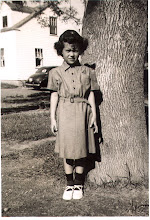the poet behind the persona
Here's what I have been thinking for awhile now: It seems to me that first person poetry has been frowned upon and labeled as confessional, personal, self-obsessed, self-glorifying, etc. I have certainly read poems that fit these labels. We all have. BUT, there is another side to this and a side I think bears discussing. Why do poets need to hide behind some idea of anonymity? If indeed we write to explore how we see the world, how we experience what the world offers etc., we ought to be able to be a bit overt about it. I am not saying that we need to give ourselves over to ruminating about our individual lives in such a way as the reader will feel he/she is intruding when reading our poems. What I am suggesting is that there are universals, places where our lives touch. We need to share those points of touch in order to feel less alone, more empowered, and to know that the human species is made up of the sum of its parts. I know that poems written with a "this happened, then this happened, and this is how I feel about that" modality miss the mark tremendously, and seem to actually exclude the readers rather than to draw them in. I read these and ask "I should care about this?" HOWEVER, these are not so much poems as they are lineated prose or worse yet, journal entries or things best shared only with family. But something as seemingly intimate as Dorianne Laux's beautiful maternal musings in Girl in the Doorway is far far far from too personal or too confessional. We can BE THERE in the house as the persona experiences the oncoming "loss" of a daughter's growing up. We don;t even need to be parents, or to have daughters. We are THERE. It is the embodiment of the event that connects us all. Yes, the poem's event is very personal. But we are brought in so that our own lives are enriched by the poet allowing us to peek, to consider, to weigh in on the universal subjects of family and loss.
What I think then, is that our task as poets is to write in such a way as to be the poet behind the persona. We can put our lives, our very intimate lives, on the page while making sure that the poem drives itself by way of solid imagery and a sense of inclusion.
On the other side of this coin, I get frustrated when reading some of my poems in a public venue that some listeners ASSUME the persona is me. What good poets do (I think) is to take a view of and a stance on what happens to and for others and comment in an intimate way through their poems. What is this idea that all we write about is what we live personally? The problem then is do we allow ourselves to write widely, making sure we don't assume cultural postures that are false? Or do we stick to what we can touch, see, smell, taste, etc.? I would not presume to attempt to write poems from another culture, for example. BUT, I do think I can write with authority on topics of interest that I have sufficiently researched and come to know deeply. It's a puzzle. What to do here? Do I have to be a victim of robbery to write from the perspective of one who has been robbed? I don't think so. I can "empathize" in my poems and put my heart and mind into the scene, coming up with my own "take" on what that would be like. I can create a "character" (persona) and be in his/her head while recovering from the event. We are all alike enough to have experienced feelings of being overpowered, being violated, feeling helpless. So, I think that we can, VERY CAREFULLY tiptoe into others' lives and make poems. I like the idea that we are all connected. We live the same lives really, flavored and shaded uniquely, but connected.
I 'd appreciate hearing from you on this.










No comments:
Post a Comment
Post here to comment. Join as a follower!